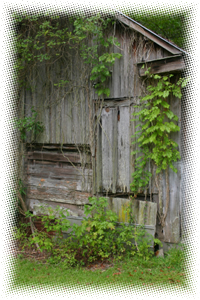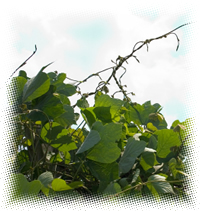Kudzu Pueraria lobata

- Common Names
- Kudzu
- Botanical Name
- Pueraria lobata
- Family
- FABACEAE
Medicinal Uses & Benefits of Kudzu
![]() How to Use|
Side Effects |
Plant & Garden|
How to Use|
Side Effects |
Plant & Garden|
- Medicinal Uses: * Addiction
* Alcoholism
* Aphrodisiac
* Cancer Prevention
* Cardiovascular
* Chinese
* Digestion
- Parts Used: dried root
- Constituents: ash, calcium, daidzein, daidzin, genistein (the same compound found in soy), riboflavin
How to Use: Kudzu
Kudzu has shown some promising results in reducing the desire for alcohol in studies. Although the mechanisms through which it works remain unclear, kudzu shows an ability to both decrease the amount of alcohol a person drinks, and help prevent hangovers.
Kudzu increases circulation, an action that tends to reduce muscle pain and stiffness, and increases blood flow through the coronary arteries. One kudzu compound is a beta-blocker, which reduces a racing pulse induced by stress. It has traditionally been used for respiratory infections. Kudzu contains an estrogenlike compound that can binds to breast cancer cells, blocking estrogen that stimulates cancer cells to reproduce.2
The starchy root of kudzu is high in complex carbohydrates, helps balance the acidic nature of many foods, and is soothing and cooling to the digestive tract. Powdered kudzu root is used to thicken sauces, especially in Asian cooking.
Preparation Methods & Dosage :Powder added to teas, extracts. Kudzu may be more effective if used in its natural state, such as in kudzu tea.
Kudzu Remedies
In traditional Chinese medicine, where it is known as gat-gun,ge gan, kudzu is considered one of the 50 fundamental herbs. TCM uses kudzu in treating the symptoms of high blood pressure such as headache and dizziness (although kudzu has little or no effect on blood pressure itself). Kudzu powder is also taken internally on a regular basis to prevent recurrences of colds sores, shingles, and genital herpes. 1
Kudzu Side Effects: None Noted
Plant Description

Kudzu has spread across millions of acres of the southwestern United States where it was imported from it's native Japan to protect against erosion. Kudzu is a climbing, woody or semi-woody, perennial vine, that seems to swallow everything it comes in contact with. Used mainly today as a starch thickener in prepared foods, recently it has been found to hold some very promising medicinal properties.
Regional Traditions :Traditional Chinese Medicine *
- Mountain Rose Herbs
- Balch, Phyllis A.,CNC. "Prescription for Herbal Healing", (2002)












